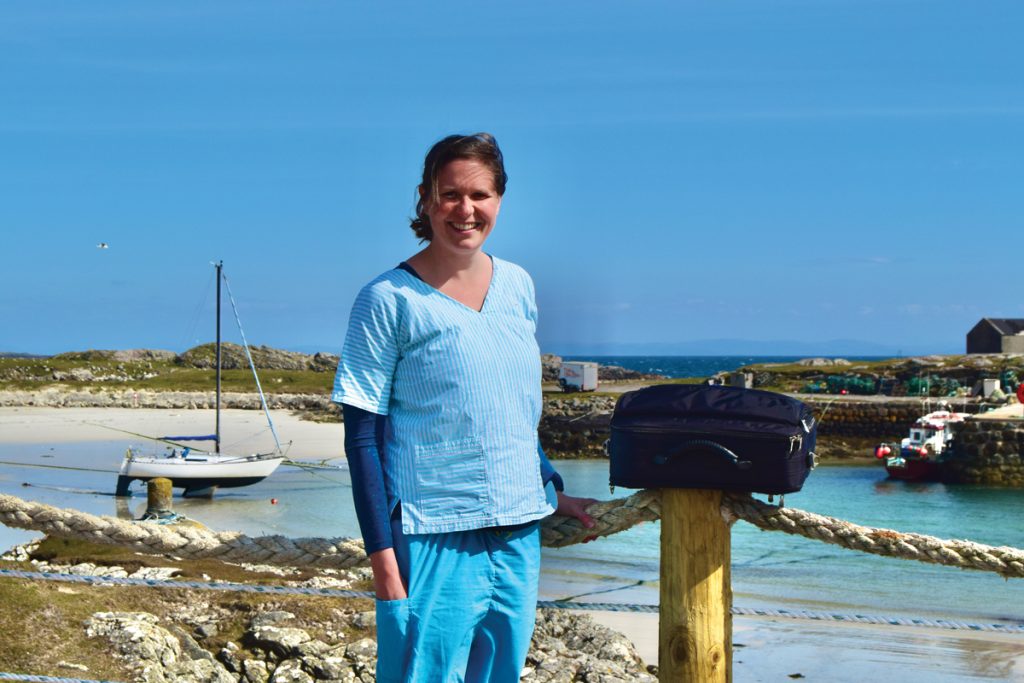Working life: Island-bound

Dr Alison Ambrose splits her GP workload between a remote Scottish island and mainland Cumbria. Here’s how she does it
Saturday
I pack our van with the paraphernalia for a week’s work for me, and a week of holiday and childminding for my partner and nine-month-old son. Then we start our long commute from Cumbria to Oban, to catch the Sunday morning ferry to Tiree. Tiree, the most westerly of the Inner Hebrides, is famed for its beaches and wind, making it a fantastic place for walks, windsurfing and surfing. It’s an interesting place to work as a GP, covering the resident population of 730 people 24/7, and thousands of visitors each summer.
The medical team comprises a practice nurse, a team of district nurses, three ambulance drivers, a midwife, a community psychiatric nurse, three receptionists and dispensers, and four GPs who each work a quarter of the year in weekly or fortnightly stints. This year, we also have our first medical student.
Sunday
Once settled into our temporary residence, we grab the chance for a family walk on the beach, while there’s no risk of me being called away. That evening, I meet the on-duty GP who hands over the active patients and any outstanding jobs. We occasionally video-call the partners for a meeting.
Monday
At 8am I’m given the baton phone and the keys to the on-call car. Monday morning surgery means telephone triage: booking in patients for face-to-face appointments; dealing with some on the phone; and arranging home visits. The Covid pandemic coincided with my maternity leave, so I’m still getting used to the new ways of working. Now, patients don’t come to a waiting room for routine appointments. If they can’t be dealt with remotely, they come to the surgery car park, wait in their cars, and I collect them, with my flimsy plastic apron flying up as the wind blows.
Tuesday
Tuesday and Thursday mornings are phlebotomy sessions – although this depends on the weather and the ferry to Oban, where the lab is. The boat leaves port at 11:30am, so it’s a hectic morning to take the bloods, spin and deliver them. It’s not uncommon for bloods to be cancelled at short notice.
With no paramedics or first responders on the island, I’m first on call for emergencies. As the final blood is spun, a patient walks in, unwell with suspected acute coronary syndrome.
All routine work stops. We move to the treatment room. This is like a mini resus room, with a patient trolley, patient monitor and emergency equipment, including oxygen and an ECG machine.
The patient needs hospitalisation. We’re unable to do urgent bloods or X-rays, so I call the air ambulance. Fortunately, the weather is good, so there are no concerns about landing the plane. I monitor the patient until a land ambulance arrives and the patient is taken to the airport. Sometimes, it’s not possible to evacuate patients, and interim management is initiated on the island, in discussion with specialists in Glasgow.
Wednesday
Once a week, we have a gold standards framework meeting with the multidisciplinary team. We discuss patients who are housebound, vulnerable or approaching the end of life.
Friday
Despite the soothing waves and dulcet tones of the lapwings, sleep can be elusive. Tonight, the baton phone wakes me. A quick chat and I swap my pyjamas for scrubs. The on-call car is packed with equipment for immediate care. Although the island is small, journeys are rarely quick. The single-track roads are occasionally blocked with livestock.
We sometimes have to involve the fire brigade or coastguard to help with casualty care on beaches and farmland. Before the pandemic, we ran a training weekend with the island’s emergency services, to allow us to become familiar with each other’s skills and equipment.
Saturday and Sunday
There are no clinics so I can explore and get some exercise, while staying close to the car in case of emergencies.
Monday
After handover, we board the ferry and travel home to the Lake District, where I work locum sessions. It’s back to a larger healthcare team and paramedics, and an A&E accessible by road.
Profile: Dr Alison Ambrose
Location
Isle of Tiree, Scotland, and Lake District, Cumbria
Roles
GP partner on Tiree, and GP locum in Cumbria
Hours worked
Approximately 13 weeks a year on Tiree, and one session a week throughout the year in Cumbria
Pulse July survey
Take our July 2025 survey to potentially win £1.000 worth of tokens












